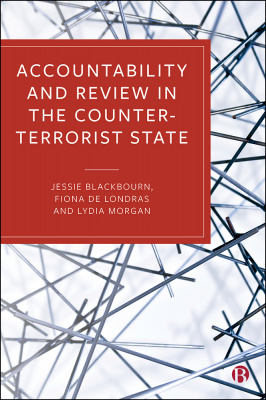 One of the major claims we make in Accountability and Review in the Counter-Terrorist State is that the UK is a counter-terrorist state: a state in which counter-terrorism law, policy discourse, and operations are mainstreamed across the domains of law and government in forms that are conceptualised and designed as being ‘permanent’ in at least some cases. This contrasts sharply with the paradigmatic understanding of counter-terrorism law, policy, and action as that which is done in response to an extraordinary threat or risk and in order to restore normalcy, at which stage these laws, policies, and measures would be suspended or cease to operate, at least to their fullest extent.
One of the major claims we make in Accountability and Review in the Counter-Terrorist State is that the UK is a counter-terrorist state: a state in which counter-terrorism law, policy discourse, and operations are mainstreamed across the domains of law and government in forms that are conceptualised and designed as being ‘permanent’ in at least some cases. This contrasts sharply with the paradigmatic understanding of counter-terrorism law, policy, and action as that which is done in response to an extraordinary threat or risk and in order to restore normalcy, at which stage these laws, policies, and measures would be suspended or cease to operate, at least to their fullest extent.
In the UK counter-terrorism has become a permanent part of state activity, with implications for the ways in which the state structures its counter-terrorism work. Increasingly this work is undertaken through permanent legislation, institutions, regulatory requirements of institutions and sectors not traditionally associated with counter-terrorism, and heavily resourced policing and intelligence operations. In spite of the apparent ‘normalisation’ of counter-terrorism that this suggests, these measures carry significant implications for the power of the state to infringe on individual liberty and human rights. It seems that, even while normalised, counter-terrorism continues to be seen as a field in which the risks of failure are so grave as to justify and necessitate intrusive and repressive measures.
We argue that this shift to a counter-terrorist state has important implications for how we enact the liberal democratic commitment to accountability. It is already well accepted that approaches to and mechanisms of accountability may need to adjust to the changing shapes and nature of the state if that state is to retain its legitimacy. The counter-terrorist state operates through a mixture of directly applicable powers (using criminal law, administrative measures, and police powers, for example), indirect coercion (through counter-extremism, for example), and regulatory power (by imposing duties to disrupt terrorist financing on financial institutions, for example). This combination of traditional power, indirect coercion, and regulation diffuses counter-terrorism across state and non-state actors, making it difficult to ensure accountability. This difficulty arises not only from the multi-level nature of the counter-terrorist state but also because conventional accountability mechanisms have tended to defer to the executive in respect of ‘security’, and seem to struggle to accommodate claims of secrecy within a commitment to accountability in the counter-terrorism context.
Our focus on counter-terrorism review, rather than on counter-terrorism per se, enables us to bring together what may at first seem a disparate set of activities and conceptualise them as an assemblage engaged in evaluation, review, and decision-making in the counter-terrorist state. In doing so against an analytical framework that draws on the concept of accountability we hope to undertake what Charles Taylor calls an ‘act of retrieval’, articulating a ‘higher’ principle that may lie behind the practice of counter-terrorism review and then analysing and critiquing the practice from that perspective.
In focusing on review in this way, we are critially aware that counter-terrorism review may in fact operate as a tool of governmentality and as part of the counter-terrorist state. In that mode, review might legitimate the laws, policies, logics and programmes that it pursues, ultimately reinforcing rather than challenging the counter-terrorist state. Our work on the everyday life of counter-terrorism review in practice suggests that review actors are keenly aware of this, but that avoiding it requires a dispositional shift away from exceptionalism, securitisation, rights-scepticism, and risk-aversion on the part of the actors that shape, pursue, and execute the counter-terrorist state. Counter-terrorism review may be capable of increasing accountability, but it depends first on a meaningful commitment to accountability on the part of the counter-terrorist state and its primary protagonists.
This is adapted from the Introduction to Accountability and Review in the Counter-Terrorist State
